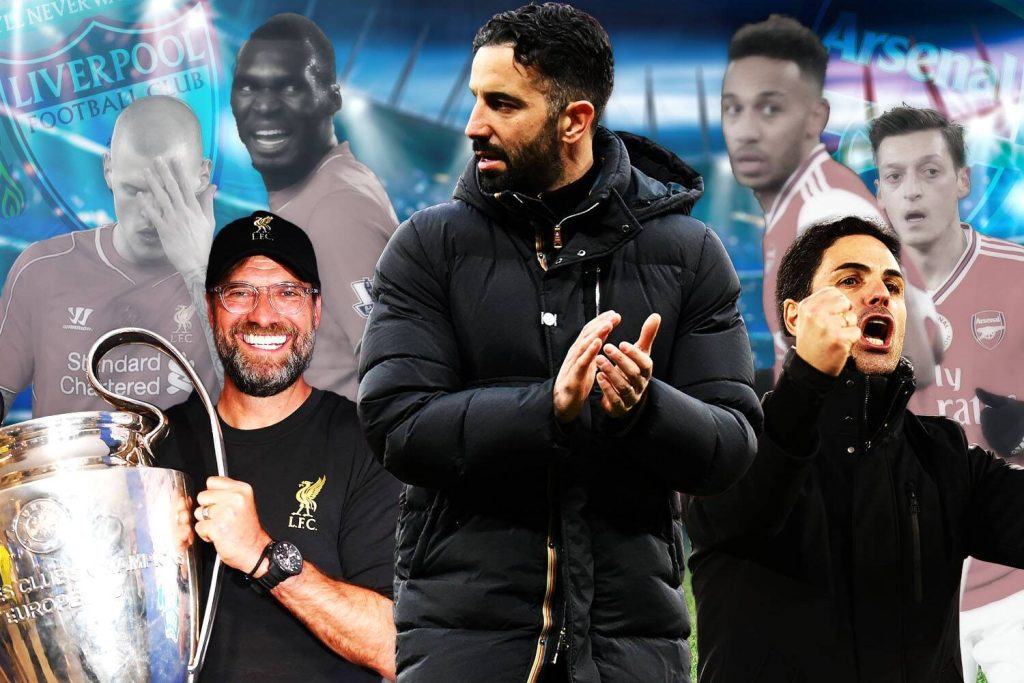Ruben Amorim faces mounting pressure at Manchester United following an uneventful winter transfer window, marked by the departure of key players like Marcus Rashford and Antony and the arrival of only two young, relatively unknown prospects. The club’s financial constraints appear to be the primary reason for the lack of significant signings, leaving fans frustrated with the lack of investment in a struggling team currently languishing in 13th place in the Premier League. However, Amorim’s situation, though born of necessity, might inadvertently mirror the rebuilding processes successfully implemented by Jurgen Klopp at Liverpool and Mikel Arteta at Arsenal. Both managers initially focused on reshaping the culture and mentality of their respective squads before making large-scale personnel changes, a strategy that ultimately yielded significant long-term success.
Klopp inherited a disjointed Liverpool squad in October 2015. His initial focus was not on immediate squad overhauls but on fostering a unified team spirit and instilling a winning mentality. He prioritized connecting with the entire club staff, from groundskeepers to star players, creating a sense of shared purpose and collective responsibility. His first transfer window saw only one minor signing, Marko Grujic, who was immediately loaned back to his previous club. Klopp’s true squad transformation began in the following summer window with significant player departures and the arrival of key figures like Sadio Mane, Georginio Wijnaldum, and Joel Matip. However, the foundation for success was laid in the preceding months through Klopp’s emphasis on cultural reset and the establishment of a strong team ethos.
Similarly, Arteta, upon joining Arsenal in December 2019, opted for a measured approach in his first transfer window, focusing primarily on loan deals. His priority was addressing the underlying issues within the squad, calling out the players and staff on their shortcomings and demanding a change in attitude and work ethic. His message centered on respect, unity, and a shared passion for the club. While the subsequent transfer windows saw more significant personnel changes, with both permanent signings and departures, Arteta’s initial focus was on establishing a strong cultural foundation. The clear-out of underperforming players and those with misaligned attitudes, including high-profile names like Mesut Ozil and Pierre-Emerick Aubameyang, followed later, paving the way for a renewed and revitalized squad.
Both Klopp and Arteta benefited from relatively positive initial results, which provided them with the necessary leeway and support to implement their long-term visions. Klopp lost only one of his first eleven games, while Arteta suffered a single defeat in his first fourteen. This early success allowed them to build momentum and solidified their authority within the clubs. Amorim, however, faces a tougher challenge, having endured a significantly less successful start to his tenure with six losses in his first eleven games and a continuing struggle for consistency. This added pressure makes it even more critical for him to establish a clear direction and instill a sense of belief within his squad.
Amorim’s decision to offload Rashford and Antony, while potentially disruptive in the short-term, can be interpreted as a decisive move to reshape the squad’s dynamics and send a clear message about accountability and commitment. However, the effectiveness of this strategy will ultimately depend on Amorim’s ability to galvanize the remaining players and instill a winning mentality. His inconsistent team selections, such as the unconventional use of Kobbie Mainoo as a false nine, further highlight the ongoing search for a winning formula and add to the sense of uncertainty surrounding the club.
The introduction of Patrick Dorgu, the sole significant signing of the winter window, adds another layer of complexity to the situation. The young left-back arrives at a club in a state of flux, tasked with contributing to a team still searching for its identity. The pressure now squarely falls on Amorim to demonstrate his managerial prowess. He must inspire his players, foster a coherent team structure, and navigate the club through its current challenges. The time for excuses is over; the manager must now deliver. The parallels with Klopp and Arteta’s early days offer a potential roadmap, but Amorim must find his own path to success, proving that he can emulate the transformative leadership of his predecessors and restore Manchester United to its former glory.


